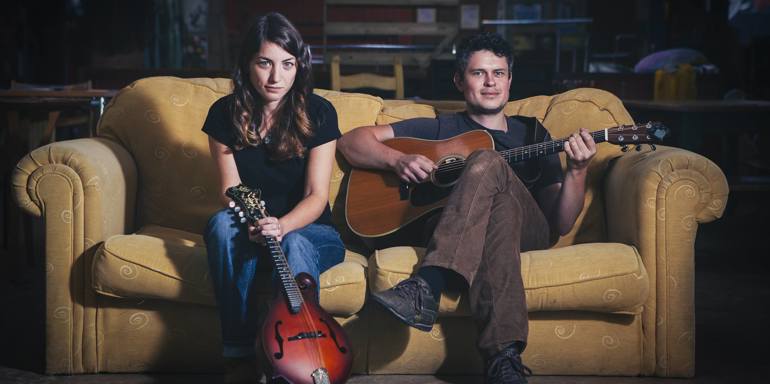
Course Studied: BA (Hons) Music (Production)
Year of Graduation: 2007
2016 has been the busiest year to date for Leeds Conservatoire Alumni Katriona Gilmore & Jamie Roberts, in which they celebrated 10 years of being a duo. Following their fourth album release, they have enjoyed two UK tours and several shows in The Netherlands, played a string of festivals (including Cropredy, run by former touring pals Fairport Convention), and released a live album. They also received a well-earned nomination for Best Folk Duo at the BBC Folk Awards.
In the first instalment of our Folk Series, we took five with Katriona & Jamie to mull over what the term “folk music” means, and what it’s like to work within the UK folk scene…
How would you define the term folk music?
(J) Folk is a broad genre which is difficult to pinpoint! Often musicians within the traditional scene see it as only traditional music. Although that’s where folk music started, it’s now an umbrella term for many sub-genres – folk punk, folk-metal, electro-folk.
(K) It doesn’t have to be traditional music – but certainly it should nod to the roots of a society. The storytelling approach is a big part of it for me, and a lot of what we do is actually pop-orientated, but with a strong storytelling element. I think it’s also about change and evolution. There are so many traditional songs which all have different titles but are based on the same section of melody or words – these songs wouldn’t exist if it weren’t for evolution. We might not still have folk music if it hadn’t evolved, or at least it wouldn’t be as popular.
(J) The instrumental side of things is really important to; it all stems from traditional dance music. Even if it’s not intended for that now, a lot of the rhythms and tempos are inspired by dance.
How might formal training work with folk music?
(K) Aside from the musical training, it’s really useful to learn about the professional side of becoming a musician, teacher or freelancer. Learning skills like promotion, accounts and recording, as well as understanding different strands of earning like PRS and PPL, are vital. One of the best things from my time at Leeds Conservatoire was that I can now record pro-quality music without having to go into the studio. So whether that’s a demo for myself or doing session work on other people’s albums remotely – none of that would be possible without the skills I learnt at Leeds Conservatoire.
What do you think of the Yorkshire folk scene?
(K) I think it’s really strong. Otley and Huddersfield in West Yorkshire have lots going on, as does York. Sheffield is fantastic, with various folk clubs, like the Nether Edge, Crookes Folk Club, and Royal Traditions. There are also quite a few venues which put on touring folk acts, like the Greystones, which is where we play the most often. We find that the folk community is very friendly, inclusive, and just happy for everyone to get up and have a go.
Do you feel that folk music is thriving – and if so why has it stood the test of time so well?
(J) Yes it is, and particularly in recent years there has been plenty of folk-influenced pop music in the mainstream. It’s brought younger people to the genre and you definitely see younger players coming through.
(K) I think folk has stood the test of time because it's music that everyone can relate to. It’s all about people. It’s so inclusive and a very welcoming and supportive community. Everyone just wants you to do well.
What advice would you have for someone looking to get into folk music?
(J) Be open to saying yes to any opportunity that comes along in the early days. Start a mailing list at an early stage to stay in touch with as many people as you can. Try and collaborate with others as much as possible – get on some new territory.
(K) Don’t get too hung up on the idea of “don’t do stuff for free” – weigh it up on case by case basis. If you get the opportunity to play in front of 200 people when you just start out, it could be well worth it. Don’t get stuck in your comfort zone. Just say yes.
Where do you see folk music going in the future?
(K) I think it’s like everything – it cycles along changing between the more contemporary approach and the traditional.
(J) There’s always people pushing the envelope and doing really contemporary arrangements of traditional songs, like English folk singer Jim Moray for example. It’s hard to say as so many cross-genre collaborations have already taken place, but I think the core of it will still stay the same.






